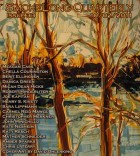Carmella said you rode a mechanical spider to our doorstep and waited seething in the rain with a rose stem crushed between your teeth. A late rain for the season, but it always rains on my birthday. I am thirty-four years old—almost old enough to be your father. Too old, certainly, for surprise visits, and for roses. I was in the hospital all night, with Marianne. She is not too old for roses, but she doesn’t know how old she is anymore, or that it was my birthday, or even that I am her brother. She sees me as the bleary-eyed man who brings chocolate truffles and talks about places and people that mean nothing to her anymore, like the Mystic River and the girl she used to be. She only mumbles and moans. Her limbs flail in spasms. They tell me her brain is riddled with tiny holes like a sponge. Sometimes she laughs and laughs at nothing. And you—could you see the humor in riding a metal bug ten soggy blocks with a rose in your teeth to knock futilely on the door of a man who can’t love you anymore? I said I did, true. You said you were pregnant. Marianne said she’d sail from Boston to Brussels in a hot air balloon.
But did you have to carve your name on our door? Carmella would have answered your knocks, but she was dead to the world with sleeping pills. I see you there, illuminated in the beams from the spider’s eyes, scarring your name into the wood. Nine ragged letters. You used the knife, I’m sure, that I gave you on your seventeenth birthday. I loved picturing you with it—running a finger along the blade, black hair in your face, turning it over in your hands like a mystery. I guided your trembling hand on that first cut, on the underside of your left breast. The flash in your eyes as you watched the blood bead down your stomach, rocking against my hand between your legs. We existed outside of time that reckless summer. But time pulled us back, and now we are paying for the months we stole.
I’ll fix the door. It’s not fair to Carmella to have to see your name every time she comes or goes. She has forgiven us both, somehow, though of course she doesn’t know how far it went, how far we took it. I believe she still loves you, Gwenie, devastating for her as that must be. You were the closest she will ever have to a daughter. It was her idea to take you in when you had nowhere else to go. But please stay away from us now. We have damaged each other enough.
It’s late, as I’m writing this, and when it’s late and I’m thinking of you, I always remember your body. I loved watching it in the sunlight those Saturdays we’d rent spiders and ride down to the Mystic to feed the ducks. Your hair in the wind on those winding roads, the skitter-scatter of sixteen metal legs on asphalt. I remember your girlish throwing motion, and how once a goose snapped at you and beat its wings, and you kicked it in the neck and sent it hissing and flapping back into the river. And later, with Carmella shut in the study composing her concerto, we plotted a tragic, glorious future together. I’d leave Carmella and we’d get married, we decided, and instead of rings we’d exchange fingers, find a surgeon who would sever our matrimonial digits, sew mine on your hand, yours on mine. We’d open our veins in a clawfoot bathtub and bathe in the bloodwater, split our tongues down the center and entwine them in a serpent’s kiss. The destruction of the body thrilled us then. It thrills you still—Carmella told me of the fresh cuts on your inner thighs, old scar tissue opened again. Gwenie, our bodies are destroyed enough without our help. I have seen the horror-shapes my sister’s body makes, writhing on sweat-drenched sheets. There is no romance in a body’s undoing, or in violence, or betrayal. What we all need now is mending.
The night of my birthday, after making your way through this rusting city to my door, what shape did your body take as you waited there for me? Did strangers walking by shake their heads with sympathy or disdain? It’s hard to find the right emotion toward the hopeless. At the hospital, Marianne was dripping bile down her chin and screeching with laughter. I came home the next morning to rose petals scattered on the steps, coiled wood shavings, and your lovely name. You were already gone. Carmella said she found you there at dawn, soaked and shivering, the spider blown a circuit and useless from waiting all night in the rain.



 The core workshop of SmokeLong Fitness is all in writing, so you can take part from anywhere at anytime. We are excited about creating a supportive, consistent and structured environment for flash writers to work on their craft in a community. We are thrilled and proud to say that our workshop participants have won, placed, or been listed in every major flash competition. Community works.
The core workshop of SmokeLong Fitness is all in writing, so you can take part from anywhere at anytime. We are excited about creating a supportive, consistent and structured environment for flash writers to work on their craft in a community. We are thrilled and proud to say that our workshop participants have won, placed, or been listed in every major flash competition. Community works.